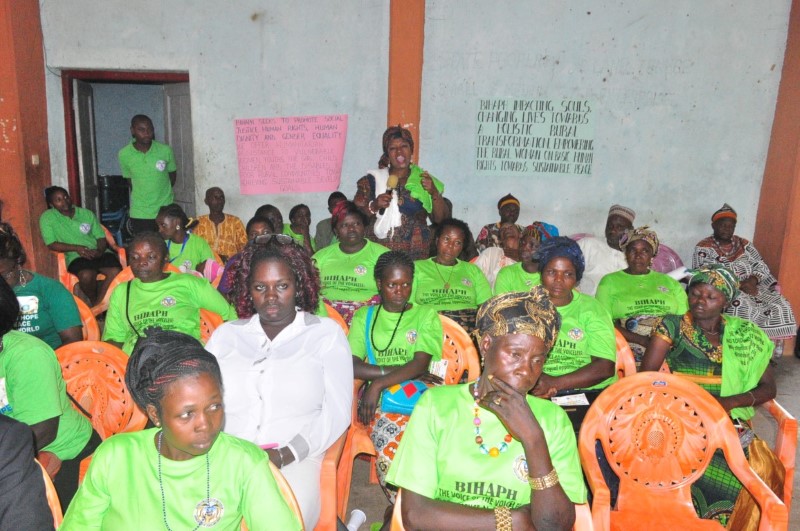BIHAPH believes empowering girls/women is one of the major ways of bringing gender equality. BIHAPH has empowered more than 1000 girls and women in poor rural communities through training in Computer studies, Secretarial Duties, Décor, Tailoring, Pastries, Market Gardening, Beads Making, and Hair Dressing etc.
At the end of this training, survivors of GBV all receive start-up kits and/or financial assistance. We currently run an empowerment center in Wum that has a functional restaurant, documentation and tailoring workshop with over 20 women employed and more than 50 girls and women undertaking vocational training.
We have empowered more than 1,500 community leaders in conflict-affected areas in poor rural communities who are now champions and voices of change to end stigmatization, prejudices, harmful cultural practices and all related ills of Sexual Exploitation and Abuse (SEA) and Gender-Based Violence(GBV) in the communities following adequate skills, and knowledge gained.
While the world has achieved progress towards gender equality and women’s empowerment under the Millennium Development Goals (including equal access to primary education between girls and boys), women and girls continue to suffer discrimination and violence in every part of the world especially in poor rural communities.
.jpg)
Gender equality is not only a fundamental human right, but a necessary foundation for a peaceful, prosperous and sustainable world. Providing women and girls with equal access to education, health care, decent work, and representation in political and economic decision-making processes will fuel sustainable economies and benefit societies and humanity at large.
BIHAPH in line with the United Nations (UN) norms is embarking on a new, global, multi-year initiative focused on eliminating all forms of violence against women and girls (VAWG) – EMPOWERING WOMEN AND THE GIRL CHILD ON BASIC HUMAN RIGHTS TOWARDS SUSTAINABLE DEVELOPMENT AND HOLISTIC TRANSFORMATION. The Initiative is so named as it brings focused attention to this issue, moving it into the spotlight and placing it at the center of efforts to achieve gender equality and women’s empowerment, in line with the 2030 Agenda for Sustainable Development.
Women and girls represent half of the world’s population and therefore also half of its potential. But, today gender inequality persists everywhere and stagnates social progress. As of 2014, 143 countries have guaranteed equality between men and women in their Constitutions but 52 have yet to take this step.
Marrying young also affects girls’ education. About one third of developing countries have not achieved gender parity in primary education. In sub-Saharan Africa, girls still face barriers to entering both primary and secondary school.
HOW DOES GENDER INEQUALITY AFFECT WOMEN?
Disadvantages in education translate into lack of access to skills and limited opportunities in the labour market. Women’s and girls’ empowerment is essential to expand economic growth and promote social development. The full participation of women in labor forces would add percentage points to most national growth rates— double digits in many cases.
ARE THERE ANY OTHER GENDERRELATED CHALLENGES?
Yes. Worldwide, 35 per cent of women have experienced physical and/or sexual intimate partner violence or non-partner sexual violence. An estimated 133 million girls and women have experienced some form of female genital mutilation/
What happens if gender equality is not ensured? Inequalities faced by girls can begin right at birth and follow them all their lives. In some countries, girls are deprived of access to health care or proper nutrition, leading to a higher mortality rate. As girls move into adolescence, gender disparities widen. Child marriage affects girls far more than boys. Globally, nearly 15 million girls under age 18 are married every year— or 37,000 each day cutting in the 29 countries in Africa where the harmful practice is most common with a high risk of prolonged bleeding, infection (including HIV), childbirth complications, infertility and death.
BUT, WHY SHOULD GENDER EQUALITY MATTER TO ME?
Regardless of where you live in, gender equality is a fundamental human right. Advancing gender equality is critical to all areas of a healthy society, from reducing poverty to promoting the health, education, protection and the well-being of girls and boys. Investing in education programmes for girls and increasing the age at which they marry can return $5 for every dollar spent. Investing in programs improving income-generating activities for women can return $7 dollars for every dollar spent.
WHAT CAN WE DO TO FIX THESE ISSUES?
If you are a girl, you can stay in school, help empower your female classmates to do the same and fight for your right to access sexual and reproductive health services. If you are a woman, you can address unconscious biases and implicit associations that can form an unintended and often an invisible barrier to equal opportunity. If you are a man or a boy, you can work alongside women and girls to achieve gender equality and embrace healthy, respectful relationships. You can fund education campaigns to curb cultural practices like female genital mutilation and change harmful laws that limit the rights of women and girls and prevent them from achieving their full potential.


